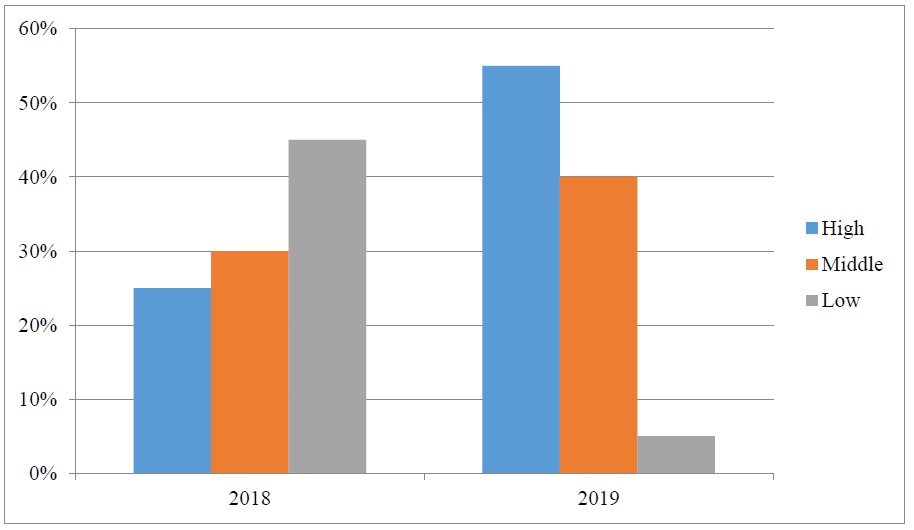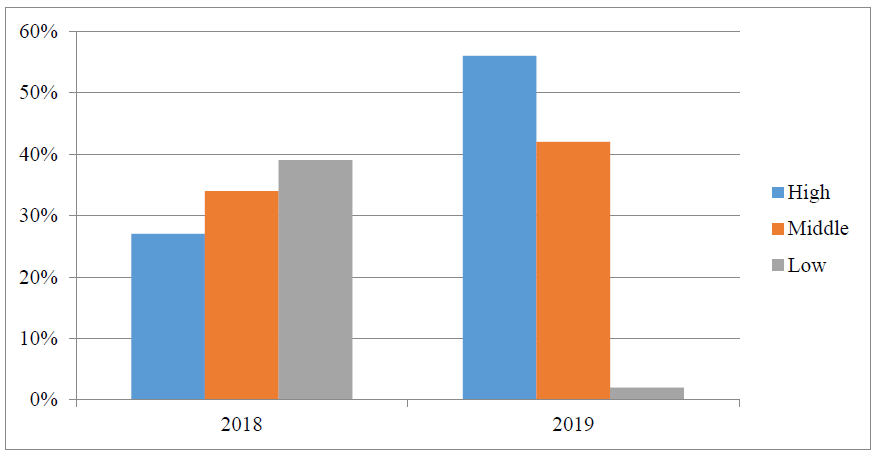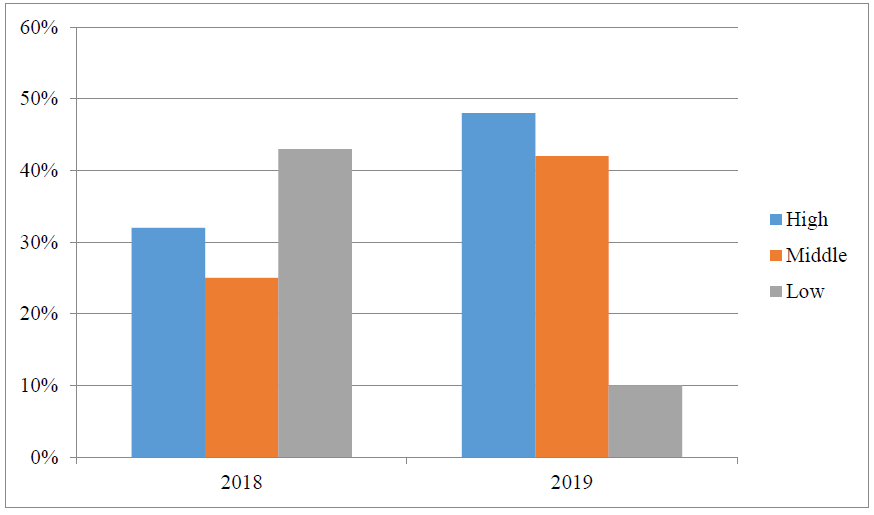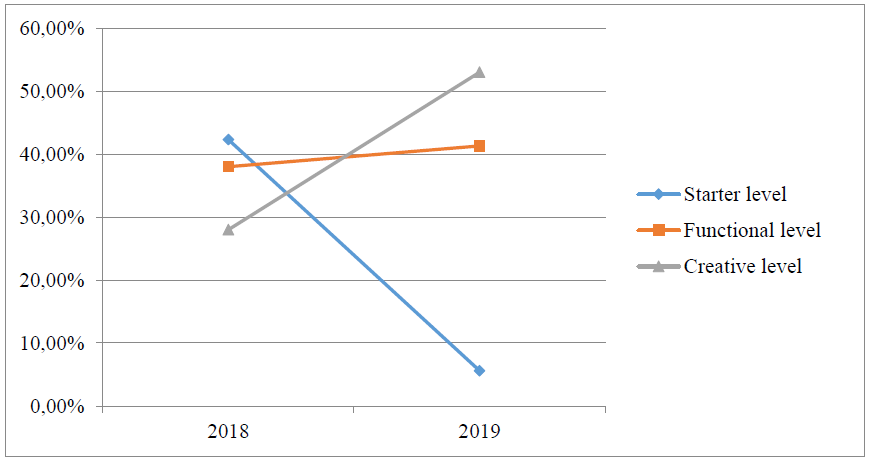The willingness of teachers to use modern educational technologies in educational process
ABSTRACT
Among the most significant trends in the development of vocational education, introduction and use of educational technologies can be distinguished. Since the main goal of higher schools is to prepare a competent competitive specialist, they search for the most suitable methods that contribute to rapid achievement of results. The use of technologies by educational institutions is explained by their advantage over other methods of developing professional competence. Due to implementation of a certain algorithm of actions, they allow you to achieve guaranteed results in a timely manner.
The purpose of the article is to form future teachers ' the level of competency development, reflecting students’ willingness to adapt, adjust and use educational technologies in professional teaching activities. To do this, we checked the level of motivation of future teachers, the level of knowledge of the theoretical foundations of educational technologies, their design and implementation in professional and pedagogical activities, and the level of formation of the ability to reflect. The development of competencies reflecting the student’s readiness to adapt, adjust and use educational technologies in professional pedagogical activity was carried out in a certain logical sequence, so that the student possessed versatile knowledge about educational technologies, was capable of their systematic creative application and his reflective activity was associated with self-actualization and striving for the implementation of constructive professional activities.
The development process was carried out in the course of students solving research and design problems. Research activity was carried out by students in the study of the course “Pedagogical technologies”, fundamental for future teachers of vocational training. The implementation of the projects was carried out during the development of the course "Project Activities of a Professional Education Teacher".
keyword
competencies, education technologies, high school, professional education, student, teacher of vocational training
Introduction
Modern vocational education is undergoing a period of redevelopment ( Chirva et al ., 2018) . With the entry of Russia into the Bologna process, it was subjected to numerous changes, which led to emergence of new development trends. The changed goal of training - the development of professional competence - has necessitated the search for ways and means that will achieve results more quickly and efficiently ( Cirdan et al ., 2019).
The relevance of the issue we are considering is due to the need of the state, society and the labor market for highly qualified teachers of vocational training capable of implementing professional activities in modern conditions, as well as the need to eliminate the existing discrepancy in the requirements for the level of training of students by employers and real training in higher education institutions ( Denysenko et al ., 2018) .
Technologization, as one of the most important directions in the development of modern education, has expanded the possibilities of preparing students ( Garnevska et al ., 2018) . To date, in the process of preparing students of higher educational institutions, various educational technologies are being implemented ( Ihnatenko et al ., 2018) . The development of educational technologies plays a significant role in the preparation of future teachers of vocational training, since their future professional activity is inextricably linked with their implementation in the training of workers, employees and mid-level specialists ( Ilyashenko et al ., 2019 b ) . Development of a student’s readiness for the implementation of educational technologies in practice, involves the creation of a special environment that affects the activation of the student’s cognitive activity, its motivation to study the material ( Ilyashenko et al ., 2019 a ).
The task of the teacher as a mentor, guiding the learning process is to:
- development of the needs of students for the development of educational technologies;
- provision of additional sources of content about educational technologies that are subject to independent study;
- development of systemic, critical thinking;
- stimulation of the student's creative position ( Kamenez . et al ., 2019)
The teacher prepares future teachers of vocational training for the implementation of professional activities through their independent development of the material and its use in practice.
Theoretical framework
The study of educational technologies in the professional training of students has been carried out for a long time (Nikishina et al., 2017).
It is worth noting that scientific and pedagogical literature contains a large number of interpretations of the concept of educational technology (Koshechko et al., 2018). However, there is no generally accepted and unambiguous interpretation today. In the works of V. V. Guzeev, M. V. Klarin, E. S. Polat and others, educational technology is understood as a socially organized process of interaction between students and teachers aimed at achieving the planned results (Kobernyk et al., 2018). Educational technology is characterized by the presence of a certain algorithm of actions that leads to guaranteed results (Oros et al., 2018). To date, the process of implementing educational technologies includes the use of various technical training tools, electronic educational tools (Markova et al., 2018). Students ' readiness to use educational technologies is formed throughout their studies (Nikonova et al., 2019a). Many scientists have dedicated their work to individual educational technologies. For Example, T. A. Golovyatenko studied the problems of teachers ' readiness to implement subject-activity technologies (Golovyatenko et al., 2009). The study of issues related to the implementation of health-saving educational technologies is reflected in the work of M. M. Kuvaeva. In modern conditions, remote technologies are widely used (Vaganova et al., 2019b), closely related to indevelopment and interactive educational technologies (Nikonova et al., 2019b). Readiness for their implementation was considered by S. A. Deeva, N. V. Lomovtseva and others. The content of professional and pedagogical training of teachers of vocational training has a complex multi-component structure (Vaganova et al., 2019c), includes a variety of objects, phenomena, and processes (Pichugina et al., 2019). Along with a large amount of theoretical material, students need to master practical skills (Prokhorova et al., 2019), apply educational technologies in conditions close to professional (Pliushch et al. 2018). Indevelopment and interactive technologies help to increase the rate of material acquisition (Petrichev et al., 2018).
Readiness to adapt, adjust and use educational technologies in professional and pedagogical activities means the student's ability to assess the potential of a particular technology in specific conditions (Osadchenko et al., 2019), the ability to apply professional knowledge and skills in practice, and to design the educational process using educational technologies (Raven et al., 2017).
Methodology
The study tested the level of competence development of future teachers of vocational training, reflecting their readiness to adapt, adjust and use educational technologies in professional and pedagogical activities (Vaganova et al., 2019a). The beginning of the study is 2018, and the end of the study is 2019.
The level was determined in accordance with the selected indicators. The study was attended by students of 2 and 3 courses, studying in the field of training "Professional training (by industry)".
We also established the level of motivation of students to study educational technologies, the level of knowledge of the theoretical foundations of educational technologies, their design and implementation in professional and pedagogical activities, and the ability to implement reflection.
The level of students' competence development showed the level of their readiness to carry out professional activities.
Indicators of future teachers of professional training competence development, reflecting readiness to adapt, adjust and use educational technologies in professional and pedagogical activities include:
- presence of cognitive interest to the study of educational technology;
- theoretical knowledge about educational technologies and their application in educational activities;
- ability to carry out reflection, adjust their activities;
- striving for self-improvement.
Results and discussion
The development of competencies, reflecting the willingness of the student to adapt, adjust, and use of educational technologies in professional pedagogical activity was carried out in a logical sequence in accordance with the procedure of studying the module "Technology of professional-pedagogical activity", which includes obligatory courses and elective courses, providing increasing competence of future teachers of vocational training through mastery of relevant competencies in the classroom in various academic courses. Among them are "Pedagogical technologies" and "Project activities of a teacher of professional training".
The development of readiness was carried out in the course of solving research and project tasks. Research activities were carried out by students in the study of the fundamental for future teachers of professional training course "Pedagogical technologies". The implementation of projects was carried out during the development of the course "Project activity of a teacher of professional training".
Students prepare creative works and perform practice-oriented tasks. They learn to design training sessions using educational technologies, develop methodological support for the learning process, and select evaluation tools. Students develop group and individual projects as part of training sessions.
We have carried out the verification of the level of students ' motivation. To create motivation, in the process of training second and third year students studying in the direction of "Professional training (by industry)", success situations were actively used, which involve the development of cooperation between students and students and teachers. Working in creative groups creates a trusting relationship with the teacher, who creates conditions in which students are not afraid to express their own opinions (Vaskovskaya et al., 2018). It warns students of negative perceptions of their failures by directing them to further improve their own knowledge (Vaganova et al., 2019e). In such circumstances, students have the right to make mistakes, and they can look for a creative solution to the issue (Vaganova et al., 2019f). The role of the teacher is to support this search, advise students, and encourage their activities (Ivanova et al., 2019). Thus, students are very active in the educational process and take part in various professional competitions and conferences (Rakhimbayeva et al., 2019).
Indicators of future teachers of professional training competence development, reflecting readiness to adapt, adjust and use educational technologies in professional and pedagogical activities include:
- presence of cognitive interest to the study of educational technology (Vaganova et al., 2019a);
- theoretical knowledge about educational technologies and their application in educational activities;
- ability to carry out reflection, adjust their activities;
- striving for self-improvement.
In relation to the indicators, we identified the levels of competence development, which shows the student's readiness to use modern educational technologies in the educational process: initial, functional, and creative. Table 1 shows the levels and their indicators.
Table 1. Levels of competence development that reflect students ' readiness to adapt, adjust, and use educational technologies in professional and pedagogical activities (as part of our study).

Readiness to adapt, adjust and use educational technologies in professional and pedagogical activities is inextricably linked to the motivation of students, with knowledge of the theoretical foundations of educational technologies, their design and implementation in professional and pedagogical activities, and the ability to implement reflection (Vaganova et al., 2019d). Students' motivation is characterized by:
- students' desire to learn content about educational technologies;
- need for deeper development of the material;
- need for self-improvement through participation in professional competitions and conferences.
Students ' motivation was formed in the course of studying the essence and features of modern educational technologies.
Figure 1 shows the results of statistical processing of indicators that allowed us to determine the level of development of the motivational component at the beginning of the study.

Fig. 1. Results of checking the level of students ' motivation at the beginning and end of the study (as part of our study)
The results obtained reflect a low percentage of students with a high level of motivation in the second year of study. By the third year, the percentage of high-level students is significantly higher. Students' motivation increases. If at the beginning of the study in 2018, 25% of students had a high level of motivation, then at the end of the study in 2019, 55% have a high level.
The level of knowledge of the theoretical foundations of educational technologies, their design and implementation in professional and pedagogical activities reflects the student's knowledge:
- conceptual framework;
- key knowledge and basic content about educational technologies;
- structure and features of technologies;
- methods and methods of their implementation in professional activities.
- methods of designing training sessions in the framework of the implementation of educational technologies.
Figure 2 shows the results of checking the level of knowledge of the theoretical foundations of educational technologies, their design and implementation in professional and pedagogical activities.

Fig. 2. Results of checking the level of knowledge of theoretical foundations of educational technologies, their design and implementation in professional and pedagogical activities at the beginning and end of the study (2018, 2019) (as part of our study)
The results of the statistical data processing check revealed the level of knowledge development of the theoretical foundations of educational technologies, their design and implementation in professional and pedagogical activities at the beginning of the study in 2018 and at the end (2019). In 2018, the majority of students (39%) had a low level of knowledge of the theoretical foundations of educational technologies, their design and implementation in professional and pedagogical activities. Only 27% of students had the necessary knowledge about educational technologies, methods and methods of their implementation in professional activities. In 2019, after the study, the situation changes in a positive direction. 56% of students have a high level of knowledge of the theoretical foundations of educational technologies, their design and implementation in professional and pedagogical activities, easily master additional material, know the terminology and know how to implement educational technologies in specific conditions.
We also carried out verification of the level of development of the capacity for reflection.
The ability to reflect is characterized by the following indicators:
- self-identification of errors and shortcomings in the work;
- ability to systematize the self-assessment process;
- understanding and determining the most effective ways to carry out activities.
Reflection testing was carried out in the process of building students ' own system of work related to the subject, reflecting the design of components of pedagogical technology. Students conducted self-assessment of various aspects of preparation for the use of educational technologies (content, projective, interactive, project, game, discussion learning and group learning technologies) in the educational process. Checking the level of development of the ability to reflect is shown in figure 2.

Fig. 3. Results of checking the level of development of students ' ability to perform reflection at the beginning and end of the study (2018, 2019) (as part of our study)
Students in the third year show the best results in their ability to exercise reflection. Most of them are able to identify shortcomings in their own activities, determine a better learning trajectory, and need additional content about educational technologies. By 2019, the percentage of students with a high level of reflection ability rises from 32% to 48%.
Identification of the level of competence development that reflects the readiness of students to adapt, adjust and use educational technologies in professional and pedagogical activities was carried out by identifying the arithmetic mean. Figure 4 shows the results of statistical data processing. The initial level is characterized by a low level of competence that reflects the readiness of students to adapt, adjust and use educational technologies in professional and pedagogical activities. The functional level is characterized by an average level of competence. The student is able to develop tactics and strategies for the implementation of their professional activities. Their reflection is associated with an attempt to assert themselves and self-realization. The creative level reflects a high level of competence development and is characterized by a high motivation of the student to use educational technologies, which has a pronounced personal significance. He has comprehensive knowledge of educational technologies and is capable of their systematic creative application. His reflexive activity is associated with self-actualization and desire to implement constructive activities.

Fig. 4. Results of checking the level of competence of students, reflecting their readiness to adapt, adjust and use educational technologies in professional and pedagogical activities (2018, 2019) (as part of our study)
The analysis of the obtained data showed that students’ readiness in the second year and in the third years of study in the considered sample has significant differences. We observe a sharp increase in the creative level and a decrease in the initial level of development of students' competencies, reflecting their readiness to adapt, adjust and use educational technologies in professional and pedagogical activities. By 2019, we were able to improve our results. The student is motivated to study professional courses, is able to independently design and implement educational technologies. His reflection is related to self-actualization and the desire to carry out constructive professional activities.
Conclusions
In the course of our work, we determined the readiness of future teachers of vocational training to carry out professional activities using educational technologies. For this purpose, the level of motivation of students, the level of ability, the level of development of knowledge of the theoretical foundations of educational technologies, their design and implementation in professional and pedagogical activities, as well as for reflection was checked.
The results of checking the level of motivation of 2nd and 3rd year students also reflect a positive trend. If at the beginning of the study in 2018, 25% of students had a high level of motivation, then at the end of the study in 2019, 55% have a high level.
The results of the statistical data processing check revealed the level of knowledge development of educational technologies theoretical foundations, their design and implementation in professional and pedagogical activities at the beginning of the study in 2018 and at the end (2019). In 2018, the majority of students (39%) had a low level of education. Only 27% of students had the necessary knowledge about educational technologies, methods and methods of their implementation in professional activities. In 2019, after the study, the situation changes in a positive direction. 56% of students have a high level of knowledge of the theoretical foundations of educational technologies, their design and implementation in professional and pedagogical activities, easily master additional material, know the terminology and know how to implement educational technologies in specific conditions.
The results of checking the level of development of the ability of students to perform 2 and 3 courses of reflection show that the level increases significantly by the end of the study. By 2019, the percentage of students with a high level of reflection ability had risen from 32% to 48%.
The results obtained help to identify the level of competence development that reflects readiness to adapt, adjust and use educational technologies in professional and pedagogical activities and have shown that improving students’ training how to use educational technologies contributes to their creative and independent implementation.

